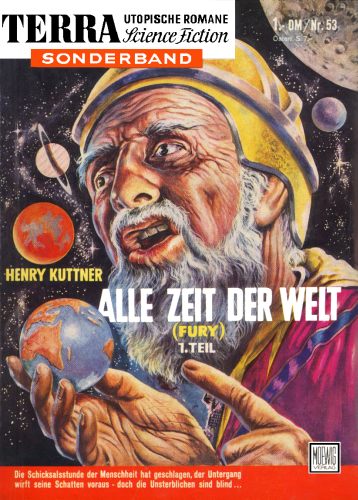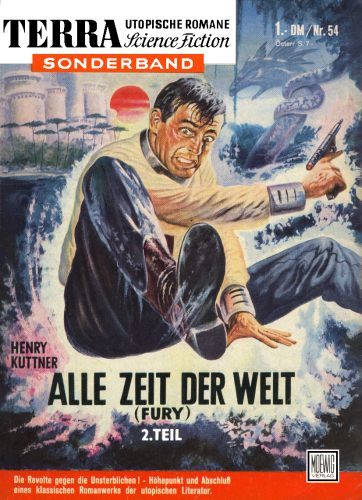

Henry Kuttner / Catherine Lucille Moore : Alle Zeit der Welt (Fury)
Terra Sonderband 53/54, 13.04.1962
Deutsche Erstausgabe
Originalausgabe ASTOUNDING 05-07/1947
Aus dem Amerikanischen von Robert W. Eiben (=Rainer Eisfeld)
Titelbilder : Johnny Bruck
Eine Rasse Unsterblicher bestimmt das Schicksal der letzten überlebenden Menschen, die sich unter Kuppeln auf dem Grunde der Venus-Ozeane zurückgezogen haben - bis eines Tages Sam Harker, einer der ihren, rebelliert und für eine neue Zukunft der Menschheit kämpft ...Klappentext
Beneath the rolling seas and deadly atmosphere of Venus are the Keeps - fully enclosed cities that house descendants of the survivors who first harbored atomic energy to escape a dying earth. In massive superstructures built beneath the Venusian seas, a complex feudal society devoted simply to decadence has evolved. Presiding over that society are Immortals - genetic throwbacks to the mutant atomic survivors. While the society is stable, the stability will only lead to its destruction, and the harsh environment outside the Keeps is malevolent and encroaching.Klappentext des Skyboat-Hörbuchs
Born into it all is Sam Harker, son of an Immortal and the object of his father's disdain after his mother perished during childbirth. Sam is subjected to treatments which stunt his growth and leave him hairless, and he is exiled from the society of the Immortals and set on the tumultuous path of a rebel's life - one inspired by hatred and a desire for vengeance on the society.
Sam's search for revenge and his great abilities make him more powerful than the more decadent residents of the Keeps... and perhaps even more powerful than the Immortals themselves. He seeks mass appeal as a politician in a campaign that assaults society. It is not until everything is destroyed - that is, in the aftermath of destruction - that the reclamation of human destiny is even a remote possibility.
Ein richtig schöner Action-Roman, interessanterweise wenig gealtert. Und eigentlich auch heute noch relativ modern, insbesondere in Bezug auf die feministischen und sexualisierten Darstellungen der Kuppel-Gesellschaft. Wie schrieb ein Rezensent so treffend : "Nimm statt der Venus einen anderen, erdähnlichen Planeten, eliminiere ein paar übriggebliebene Chauvinismen, mach' die Sex-Szenen etwas expliziter und der Roman ist absolut up to date." (John Grant : Fury)
Obwohl der Roman allgemein unter dem Label "Kuttner" verkauft wird, ist er doch ein Gemeinschaftswerk von ihm und seiner Frau. Tatsächlich ist die Geschichte ursprünglich auch unter dem gemeinsamen Pseudonym "Lawrence O'Donnell" bei ASTOUNDING erschienen. Catherine Lucille Moore sagt dazu im Vorwort der Peregrine-Ausgabe 1975, daß sie ein Achtel dazu beigetragen hat :
This is the story behind the story of FURY. It's as good a way as any I can think of to write an introduction to the present edition.zitiert nach Chris Perridas : Antiquarian Weird Tales
Henry Kuttner and I made our living by writing. So of course FURY was written primarily for money. But since we deliberately chose this rather agonizing way of making a living, we must have got something more than money out of it, and of course we did.
There, is a wonderful point in many stories which comes after the characters and the general lines of action are set, when things begin to move by themselves. This is where the unconscious takes over. All the writer's submerged beliefs and fears and hopes come surging joyfully to the surface to take full charge, and the writer's only function is to type fast enough to keep up. This happy state unfortunately isn't common. But when it does come, there are few greater pleasures in life.
The reason, of course, it that (besides the necessary money) such stories bring their writers that glorious freefall sensation which is a kind of catharsis of the unconscious. Characters personifying one's deeply felt beliefs and values test them out in action in a fictional world. You don't know at the time what's happened. You just know you feel wonderful. Long afterward, rereading the work, you can see what lies just under the surface.
Yesterday I reread' FURY for the first time in many years, and I'm not surprised, but interested, to see in it the two recurring themes which emerge quite explicitly in nearly everything we wrote. Hank's basic statement was something like, "Authority is dangerous and I will never submit to it." Mine was, "The most treacherous thing in life is love." In FURY these two ideas underlie everything that happens. I can identify which parts I contributed and which he did by this alone.
FURY was written by about one and an eighth persons. We collaborated on almost everything we wrote, but in varying degrees. It worked like this. After we'd established through long discussion the basic ideas, the background and the characters, whichever of us felt like it sat down and started. When that one ran down, the other, being fresh to the story, could usually see what ought to come next, and took over. The action developed as we went along. We kept changing off like this until we finished. A story goes very fast that way.
Each of us edited the other's copy a little when we took over, often going back a line or two and rephrasing to make the styles blend. We never disagreed seriously over the work. The worst clashes of opinion I can remember ended with one of us saying, "Well, I don't agree, but since you feel more strongly than I do about it, go ahead." (When the rent is due tomorrow, one tends toward quick, peaceful settlements.)
In FURY, which is a good example of this process, I wrote comparatively little of the copy. The idea was basically Hank's and I didn't identify very strongly with it. I didn't identify with Sam Reed, the lead character. But what I did contribute I can recognize instantly, after all these years, by the passages in which color-images pre-dominate, and in which my dramatically gloomy theme appears.
Rereading the book now, I find I enjoy it very much. I can accept the theme of FURY. I can even accept Sam, feeling rather horrified at my own acceptance of what he acomplished. Given the basic premise of the story, he had to be what he was - utterly ruthless, terribly intelligent, terribly vulnerable, fighting every hour of his life by every savage form of trickery, betrayal, murder, to reach a goal he was never truly aware of.
The premise is that mankind, having settled down in a luxurious Eden of the future, with no challenges left, would slowly strangle in its own inertia if, out of somewhere, a deliverer did not come with a flaming sword to drive them back to life.
In this case life is the almost intolerable condition on the continents of Venus, full of the fury of mindless animal and vegetable and insect life gone wild with growth and death. Even the soil and the air are alive with fierce bacterial forms in constant struggle for survival widl every other lifeorm on the planet.
How Sam fulfills this challenge, by the most complex methods, for the worst of motives, is the story of FURY,
I often think about that last line, too. And wonder.
Wie gesagt, mir hat der Roman gefallen, insbesondere auch der deutlich spürbare Einfluß von C. L. Moore. Allerdings möchte ich nicht verschweigen, daß dies ein reiner Action-Roman ist, geschrieben um Geld zu verdienen und nicht aus künstlerischem Anspruch. Im Gegensatz zu einigen anderen Romanen der beiden Autoren ist er doch relativ eindimensional. Obwohl die Darstellung der Flüchtlingsgesellschaft auf der Venus gut durchdacht und nicht-trivial ist, besteht die Handlung doch eher aus Standard-Aktionen. Und mir fehlt hier so ein bißchen das Flair, das insbesondere die Romane von C. L. Moore - etwa "Shambleau" - auszeichnet. Von daher kann ich ihn nur eingeschränkt empfehlen.
Martyn Casserly : The forgotten Sci-Fi master
Keine Kommentare:
Kommentar veröffentlichen